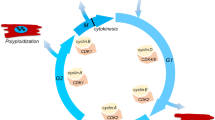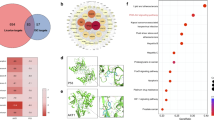Abstract
Myocardial ischemia-reperfusion (I/R) injury is a major cause of poor hemodynamic reconstitution outcomes after myocardial infarction or circulatory arrest. Currently, the search for effective therapeutic agents and tools is a focus of research in the field of myocardial I/R injury. Resveratrol (Res) has been extensively studied in recent years because of its good cardiovascular therapeutic effects, but its specific mechanism of action has not been fully elucidated. Therefore, the aim of this study was to investigate the mechanism of interaction between myocardial I/R injury and Res in vitro and in vivo. In our in vivo study, we used PI/TUNEL staining and western blotting to detect relevant necroptotic key molecules such as RIP1, RIP3 and p-MLKL/MLKL to observe myocardial necroptosis. The extent of myocardial injury was determined using hematoxylin and eosin (HE) staining and 2,3,5-triphenyltetrazolium chloride (TTC) staining as well as serum levels of CK-MB and LDH and echocardiography. In the in vitro study, cellular injury was assessed by CCK-8 and cell supernatant LDH levels. In addition, we used small interfering RNA (siRNA) transfection to knock down YAP, a key effector molecule of the Hippo pathway, to validate the molecular mechanism of action by which Res exerts myocardial protection. The localization of YAP in H9c2 cardiomyocytes was examined using immunofluorescence. Our data demonstrated that Res could ameliorate myocardial I/R-induced necroptosis by modulating the Hippo pathway, and that the beneficial effect of Res might be associated with nuclear translocation of the transcriptional regulator YAP.






Similar content being viewed by others
Data Availability
The data that support the findings of this study are available from the corresponding author or first author (tianhao2020@aliyun.com) upon appropriate request.
References
Degterev A, Huang Z, Boyce M, Li Y, Jagtap P, Mizushima N, Cuny GD, Mitchison TJ, Moskowitz MA, Yuan J (2005) Chemical inhibitor of nonapoptotic cell death with therapeutic potential for ischemic brain injury. Nat Chem Biol 1:112–119
Gal R, Deres L, Toth K, Halmosi R, Habon T (2021) The Effect of Resveratrol on the Cardiovascular System from Molecular Mechanisms to clinical results.Int J Mol Sci22
Heusch G, Gersh BJ (2017) The pathophysiology of acute myocardial infarction and strategies of protection beyond reperfusion: a continual challenge. Eur Heart J 38:774–784
Huang J, Wu S, Barrera J, Matthews K, Pan D (2005) The Hippo signaling pathway coordinately regulates cell proliferation and apoptosis by inactivating Yorkie, the Drosophila Homolog of YAP. Cell 122:421–434
Jennings RB (2013) Historical perspective on the pathology of myocardial ischemia/reperfusion injury. Circ Res 113:428–438
Kuznetsov AV, Javadov S, Sickinger S, Frotschnig S, Grimm M (2015) H9c2 and HL-1 cells demonstrate distinct features of energy metabolism, mitochondrial function and sensitivity to hypoxia-reoxygenation. Biochim Biophys Acta 1853:276–284
Li H, Zheng F, Zhang Y, Sun J, Gao F, Shi G (2022a) Resveratrol, novel application by preconditioning to attenuate myocardial ischemia/reperfusion injury in mice through regulate AMPK pathway and autophagy level. J Cell Mol Med 26:4216–4229
Li T, Tan Y, Ouyang S, He J, Liu L (2022b) Resveratrol protects against myocardial ischemia-reperfusion injury via attenuating ferroptosis. Gene 808:145968
Li W, Li W, Leng Y, Xiong Y, Xia Z (2020) Ferroptosis is involved in diabetes myocardial Ischemia/Reperfusion Injury through endoplasmic reticulum stress. DNA Cell Biol 39:210–225
Li Y, Hao H, Yu H, Yu L, Ma H, Zhang H (2022c) Ginsenoside Rg2 ameliorates myocardial Ischemia/Reperfusion Injury by regulating TAK1 to inhibit necroptosis. Front Cardiovasc Med 9:824657
Ma S, Meng Z, Chen R, Guan KL (2019) The Hippo Pathway: Biology and Pathophysiology. Annu Rev Biochem 88:577–604
Meng Z, Moroishi T, Guan KL (2016) Mechanisms of Hippo pathway regulation. Genes Dev 30:1–17
Pocaterra A, Romani P, Dupont S (2020) YAP/TAZ functions and their regulation at a glance.J Cell Sci133
Sun L, Wang H, Wang Z, He S, Chen S, Liao D, Wang L, Yan J, Liu W, Lei X, Wang X (2012) Mixed lineage kinase domain-like protein mediates necrosis signaling downstream of RIP3 kinase. Cell 148:213–227
Tanzer MC, Tripaydonis A, Webb AI, Young SN, Varghese LN, Hall C, Alexander WS, Hildebrand JM, Silke J, Murphy JM (2015) Necroptosis signalling is tuned by phosphorylation of MLKL residues outside the pseudokinase domain activation loop. Biochem J 471:255–265
Tian H, Xiong Y, Zhang Y, Leng Y, Tao J, Li L, Qiu Z, Xia Z (2021) Activation of NRF2/FPN1 pathway attenuates myocardial ischemia-reperfusion injury in diabetic rats by regulating iron homeostasis and ferroptosis. Cell Stress Chaperones 27:149–164
Toldo S, Mauro AG, Cutter Z, Abbate A (2018) Inflammasome, pyroptosis, and cytokines in myocardial ischemia-reperfusion injury. Am J Physiol Heart Circ Physiol 315:H1553–h1568
Wang K, Li Y, Qiang T, Chen J, Wang X (2021) Role of epigenetic regulation in myocardial ischemia/reperfusion injury. Pharmacol Res 170:105743
Xia N, Daiber A, Förstermann U, Li H (2017) Antioxidant effects of resveratrol in the cardiovascular system. Br J Pharmacol 174:1633–1646
Xin M, Kim Y, Sutherland LB, Murakami M, Qi X, Mcanally J, Porrello ER, Mahmoud AI, Tan W, Shelton JM, Richardson JA, Sadek HA, Bassel-Duby R, Olson EN (2013) Hippo pathway effector Yap promotes cardiac regeneration. Proc Natl Acad Sci U S A 110:13839–13844
Yu D, Xiong J, Gao Y, Li J, Zhu D, Shen X, Sun L, Wang X (2021) Resveratrol activates PI3K/AKT to reduce myocardial cell apoptosis and mitochondrial oxidative damage caused by myocardial ischemia/reperfusion injury. Acta Histochem 123:151739
Yuan J, Amin P, Ofengeim D (2019) Necroptosis and RIPK1-mediated neuroinflammation in CNS diseases. Nat Rev Neurosci 20:19–33
Zhang J, Yu P, Hua F, Hu Y, Xiao F, Liu Q, Huang D, Deng F, Wei G, Deng W, Ma J, Zhu W, Zhang J, Yu S (2020) Sevoflurane postconditioning reduces myocardial ischemia reperfusion injury-induced necroptosis by up-regulation of OGT-mediated O-GlcNAcylated RIPK3. Aging 12:25452–25468
Zhang T, Zhang Y, Cui M, Jin L, Wang Y, Lv F, Liu Y, Zheng W, Shang H, Zhang J, Zhang M, Wu H, Guo J, Zhang X, Hu X, Cao CM, Xiao RP (2016) CaMKII is a RIP3 substrate mediating ischemia- and oxidative stress-induced myocardial necroptosis. Nat Med 22:175–182
Zheng Y, Pan D (2019) The Hippo Signaling Pathway in Development and Disease. Dev Cell 50:264–282
Zhu H, Tan Y, Du W, Li Y, Toan S, Mui D, Tian F, Zhou H (2021) Phosphoglycerate mutase 5 exacerbates cardiac ischemia-reperfusion injury through disrupting mitochondrial quality control. Redox Biol 38:101777
Acknowledgements
This study was supported by grants from the National Natural Science Foundation of China (No. 81970722).
Author information
Authors and Affiliations
Contributions
Hao Tian contributed to the conception and design of the experiment, and participated in data acquisition. Yonghong Xiong contributed to the data analysis and interpretation. Zhongyuan Xia the guarantor of this work. All authors approved the final version of the paper.
Corresponding author
Ethics declarations
Declaration of competing interest
The authors have declared that no competing interest exists.
Additional information
Publisher’s note
Springer Nature remains neutral with regard to jurisdictional claims in published maps and institutional affiliations.
Rights and permissions
Springer Nature or its licensor (e.g. a society or other partner) holds exclusive rights to this article under a publishing agreement with the author(s) or other rightsholder(s); author self-archiving of the accepted manuscript version of this article is solely governed by the terms of such publishing agreement and applicable law.
About this article
Cite this article
Tian, H., Xiong, Y. & Xia, Z. Resveratrol ameliorates myocardial ischemia/reperfusion induced necroptosis through inhibition of the Hippo pathway. J Bioenerg Biomembr 55, 59–69 (2023). https://doi.org/10.1007/s10863-022-09954-3
Received:
Accepted:
Published:
Issue Date:
DOI: https://doi.org/10.1007/s10863-022-09954-3




